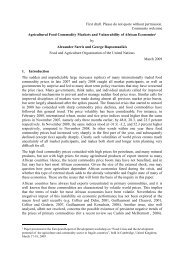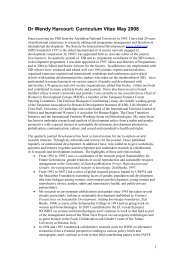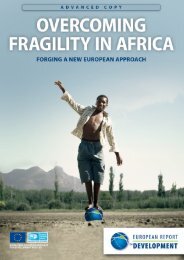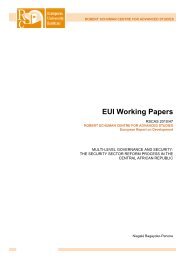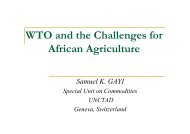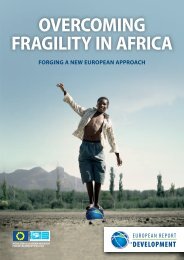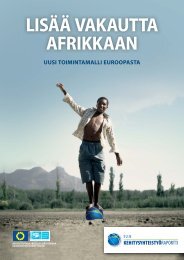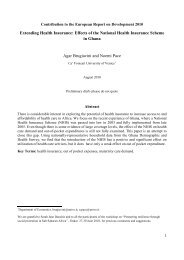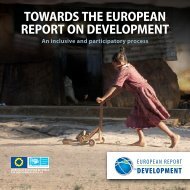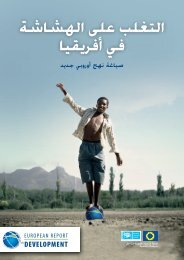Gender Issues and Development Policy Implications, by ... - ERD
Gender Issues and Development Policy Implications, by ... - ERD
Gender Issues and Development Policy Implications, by ... - ERD
Create successful ePaper yourself
Turn your PDF publications into a flip-book with our unique Google optimized e-Paper software.
<strong>ERD</strong> 2009<br />
<strong>Gender</strong> <strong>Issues</strong> <strong>and</strong> <strong>Development</strong> <strong>Policy</strong><br />
<strong>Implications</strong><br />
Dr Wendy Harcourt, 6 February 2009<br />
<br />
<br />
<br />
<br />
<br />
<br />
Coherency with European <strong>and</strong> international gender <strong>and</strong> development policy<br />
<strong>Gender</strong> <strong>and</strong> development concerns in fragile states<br />
Indicators <strong>and</strong> data on gender disparities<br />
<strong>Gender</strong> <strong>and</strong> violence in fragile states<br />
<strong>Gender</strong> <strong>and</strong> food security<br />
<strong>Gender</strong> relations, fragile countries <strong>and</strong> the current global financial crisis
Coherency with European <strong>and</strong> international gender <strong>and</strong><br />
development <strong>Policy</strong><br />
<strong>ERD</strong> 2009 will review the gender <strong>and</strong><br />
development policy frameworks (the MDGs, , the<br />
Paris Declaration, the outcome of Accra <strong>and</strong> the<br />
work of the <strong>Gender</strong>Net OECD-DAC) DAC) on the<br />
promotion of gender equality <strong>and</strong> empowerment<br />
of women as essential to economic well-being<br />
<strong>and</strong> the advancement of the MDGs overall goal<br />
to halve poverty <strong>by</strong> 2015.
<strong>ERD</strong> 2009 will also take into account the<br />
findings of the IMF <strong>and</strong> World Bank Global<br />
Monitoring Report: Millennium <strong>Development</strong> Goals:<br />
Confronting the Challenges of <strong>Gender</strong> Equality <strong>and</strong><br />
Fragile States 2007 which focuses on gender<br />
equality <strong>and</strong> the lack of opportunities for<br />
women <strong>and</strong> the vulnerability of fragile states.
<strong>Gender</strong> <strong>and</strong> development concerns in<br />
fragile states<br />
<strong>Gender</strong> issues are varied <strong>and</strong> complex in<br />
peacetime, <strong>and</strong> change or may become rigidified<br />
in pre-crisis, crisis <strong>and</strong> post-crisis situations.<br />
<strong>ERD</strong> 2009 will examine policy approaches for<br />
fragile states that can move women from a<br />
victimized situation to being an active<br />
participant in development.
<strong>ERD</strong> 2009 will consider how state fragility affects men<br />
<strong>and</strong> women differently, <strong>and</strong> how donor responses<br />
might address gender differences <strong>and</strong> gender relations<br />
in their fragile states programming.<br />
<strong>ERD</strong> 2009 will examine current policies for gender<br />
programming in fragile states where states cannot<br />
provide even the most basic public goods such as<br />
protection from massive violence to most citizens.
Indicators <strong>and</strong> data on gender disparities<br />
The ‘hard figures' produced <strong>by</strong> quantitative methods<br />
are crucial to building the case for addressing gender<br />
disparities but some aspects of gender (in)equality(<br />
are<br />
difficult to define, such as the gender dimensions of<br />
poverty <strong>and</strong> the impact of gender-based violence (GBV)<br />
that occur in sensitive contexts like armed conflict.<br />
<strong>ERD</strong> 2009 will consider how to take forward the new<br />
gender sensitive indicators being developed that reflect<br />
gender inequalities.
<strong>ERD</strong> 2009 will review the African <strong>Gender</strong> <strong>and</strong><br />
<strong>Development</strong> Index <strong>and</strong> consider how to translate<br />
sensitive <strong>and</strong> complex data into analyses that allow<br />
policy makers to measure achievements <strong>and</strong> gaps in<br />
gender policy.<br />
<strong>ERD</strong> 2009 will build on the work of the OECD<br />
evidence gathering project on gender equality, human<br />
rights <strong>and</strong> social exclusion in fragile states in Africa as<br />
input to the Ghana high level forum on aid<br />
effectiveness <strong>and</strong> progress towards the MDGs.
<strong>ERD</strong> will also raise questions about how to incorporate<br />
a broader set of indicators on, for example, female<br />
deprivation, domestic violence <strong>and</strong> l<strong>and</strong> ownership into<br />
measurements of development.<br />
The new work on gender indicators <strong>and</strong> gender<br />
budgeting in East Africa will be assessed as part of the<br />
<strong>ERD</strong> 2009 examination of gender gaps in development.
<strong>Gender</strong> <strong>and</strong> violence in fragile states<br />
<br />
One of the major consequences of fragility is the increase in<br />
gender based violence during <strong>and</strong> after conflicts. There are<br />
important initiatives <strong>and</strong> studies on gender based violence,<br />
trafficking of women that centre around the UN Resolution<br />
1325: protecting women in conflict <strong>and</strong> enhancing a gender<br />
perspective in peace processes.<br />
<br />
Conflict impacts on women <strong>and</strong> men in different ways <strong>and</strong> these<br />
need to be taking into account in establishing new more effective<br />
institutions. There is considerable work done in the Great Lakes<br />
area on the challenge of institution building post-conflict from a<br />
gender perspective that can be drawn on that has had major<br />
input <strong>by</strong> EU donors <strong>and</strong> the UN.
<strong>Gender</strong> <strong>and</strong> food security<br />
<br />
<br />
<br />
The <strong>ERD</strong> 2009 will draw on the major studies undertaken <strong>by</strong><br />
African research organizations as well as EU donors such as<br />
DFID on the gender implications of the food crisis in Africa<br />
where 80% of community farmers are women <strong>and</strong> are primarily<br />
responsible for their families' food <strong>and</strong> nutrition.<br />
The <strong>ERD</strong> 2009 will examine gender in relation to sustainable<br />
agriculture <strong>and</strong> food security.<br />
The <strong>ERD</strong> will examine how women <strong>and</strong> men being impacted<br />
differently <strong>and</strong> the consequences of the crisis for the role that<br />
women play in household <strong>and</strong> community decisions as important<br />
lessons on the role of agriculture in the process of economic<br />
development <strong>and</strong> poverty reduction.
<strong>Gender</strong> relations, fragile countries <strong>and</strong> the current global<br />
financial crisis<br />
<strong>Development</strong> implies the integration of livelihoods into<br />
an increasingly global economy. Individual men’s <strong>and</strong><br />
women’s livelihoods <strong>and</strong> the fate of local communities<br />
cannot be viewed in isolation from national or<br />
international structures <strong>and</strong> processes.<br />
Micro <strong>and</strong> macro considerations have to be brought<br />
together in order to provide fresh perspectives <strong>and</strong><br />
insights on issues that previously were studied in<br />
isolation from each other. This is particularly the case in<br />
relation to gender <strong>and</strong> development policy at both the<br />
micro <strong>and</strong> macro level.
<strong>ERD</strong> 2009 will profile new ways of thinking about how<br />
the state <strong>and</strong> market can work together to encourage<br />
sustainable development from a gender perspective.<br />
<strong>ERD</strong> 2009 will review how gender has been taken into<br />
account <strong>by</strong> local peoples, governments, scholars,<br />
development practitioners <strong>and</strong> international agencies in<br />
new policies, programmes <strong>and</strong> practices to deal with<br />
countries <strong>and</strong> parts of countries moving into crisis, in<br />
crisis, <strong>and</strong> recovering from crisis.



